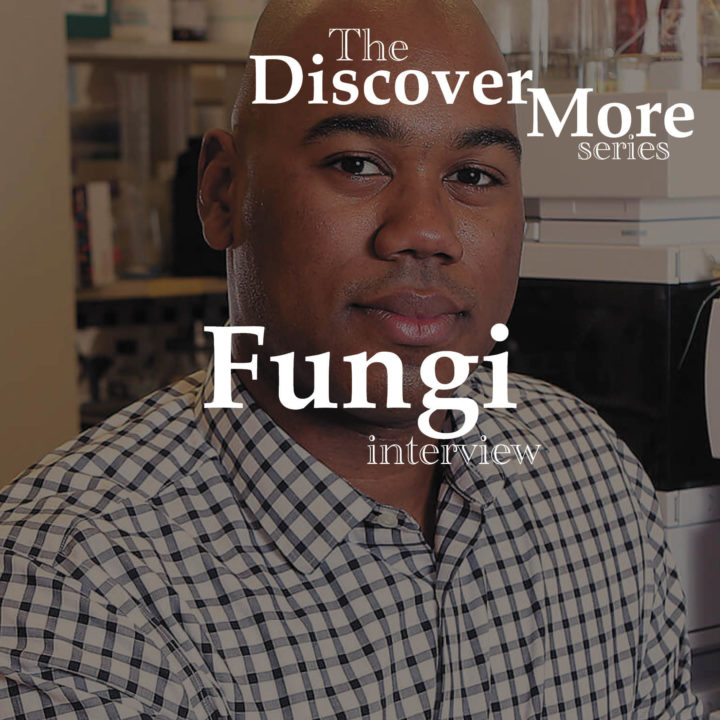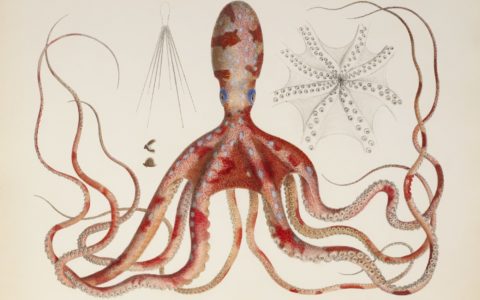Discover More: Fungi
This group of organisms are actually more closely related to animals than they are plants, but they are so radically different to either that scientists group them in a kingdom of their own. Discover more with Linnean Learning.
Published on 23rd November 2021
The Discover More series is a collection of animations, blogs and interviews exploring a wide variety of topics to enrich your appreciation of the wonderful natural world that we are a part of. There are seven topics which will be released throughout 2021 and the animations are best viewed via Instagram @LinneanLearning.

Screenshot from our animations on Instagram.
Back in Carl Linnaeus’s day, Carl included fungi in his Kingdom of Plants, categorising them as “cryptogamia”; this is because he was used to categorising plants based on their sexual organs, but as far as he could tell, fungi didn’t have them (crypto means hidden!).
We now don’t consider Fungi as part of the Kingdom of Plants; they are their own Kingdom, and are actually more closely related to the Animal Kingdom, that is, us, than they are to the Plant Kingdom.
Incredibly diverse, beautiful, weird, and helpful or harmful to humans, there is much we need yet to learn about the fascinating Kingdom of Fungi, but scientists have been discovering more and more about how fungimental(!) they are, and how they might help us solve some of the biggest ecological issues of tomorrow. We’ve discovered more about these fantastic organisms by talking with expert Kevin Solomon from the University of Delaware about the work that he does there with fungi.
Read a couple of fungal examples below, watch our short animations on Instagram, Twitter or TikTok and enjoy our interview with Kevin on those platforms or as a transcript (see below).
Newsflash! Fungi aren’t just mushrooms. Mushrooms are just the ‘fruit’ of a fungus, like the apple isn't the whole apple tree. We often think of fungi as mushrooms, but mushrooms are just the fruiting body of the fungus, like the apple isn't the whole apple tree. Fungi that make mushrooms will often be composed of many root-like structures called hyphae, under the ground. When the hyphae perform sexual reproduction, they produce the mushroom. The mushroom itself allows for asexual reproduction, creating and scattering spores, which themselves will make more hyphae.
What does fungus sex look like? Some fungi can have up to 36,000 sexes! Many fungi have a system of sexual reproduction called a mating-type system. They distinguish which other of their species they can mate with depending on variations of specific genes. That means some have two sexes, or mating-types, whilst other fungi much higher numbers of sexes. In the case of the split gill fungus, Schizophyllum commune, they can have distinct variations on these genes that mean it has 28,000 different mating-types.
Fungi are tough cookies! The cell-walls of fungi have the same material that makes insects exoskeletons tough - chitin. Another component of their cell-walls that makes them hardy is a material called glucan, a substance found in some plants and bacteria. Though other types of organism do use these molecules, all fungi use them together to create their cell walls.
Fungi break it down... Fungi were some of the early pioneers in moving out of the ocean and colonising the land, helping other life be able to do the same later. As much of life remained in the oceans, fungi began to make their way onto land. Because of their digestive mechanism, dissolving and digesting materials out of their bodies and then absorbing them, the enzymes some fungi produce are so corrosive that over time they were able to break down many different kinds of rock, releasing minerals and nutrients and making the earth more hospitable for other kinds of life, making the soil richer. Not only that, but many fungi formed symbiotic relationships with plants, in which plants' root-systems were combined with fungi's hyphae, forming structures called mycorrhiza-- this meant plants were able to move further away from the oceans and into land and access nutrients they weren't previously able to get, fungi received sugars from the plants in exchange.
What do you think about the fungi? Do you have a favourite mushroom? You can let us know through our Instagram, Twitter or TikTok, or even send us an email at learning@linnean.org
Discover More!
An interview to an expert in fungi

We spoke with Kevin Solomon from the University of Delaware about the work that he does there with fungi.
The following text is an edited interview between Kevin and our Research Officer, Zia. You can view this interview on Instagram or TikTok
Thanks for chatting with me. Please introduce yourself!
Hi, my name is Kevin Solomon and I'm an assistant professor of chemical and biomolecular Engineering here at the University of Delaware in the state of Delaware, United States. Yeah, so I mean, I go by many, many titles, like some people would call me a biological engineer and some people might call me a biomolecular engineer. Some people might call me a synthetic biologist. We go by a variety of terms, but it's just the merging of the disciplines of engineering and biology, right. So on one hand we have to understand how biological systems work. But on the other hand, we also know standard engineering principles for how the world works in general. And we can use that to combine biological systems with those principles to, for example, make a biological computer out of DNA, like having cells compute, and make decisions.
What are fungi?
They are just one form of life. Just like we have plants, we have animals, we have bacteria. fungi are a group of organisms that come in a range of forms. Some of them are multicellular, so they form structures that you can see with the naked eye. So things like mushrooms. And some of them are unicellular, they're single cell organisms. And these are microscopic things that we use for a variety of applications, such as baker's yeast, which we use to make bread, to make beer, and so on and so forth. And so these fungi, they come in a variety of different forms, and their primary role is they're nature's recyclers. They decompose and recycle carbon in a variety of forms. And so really, the world that we have around us really exists, thanks to them. I mean, if it weren't for fungi, there would be essentially a garbage heap. That's the world. I mean, every time a tree falls over, it wouldn't decay, it would just kind of wait around. But thanks to the actions of fungi and other microorganisms, these things break down, that carbon gets recycled into the soil, we get new trees, get food that can sustain you and I, and so on and so forth.
That’s interesting! I think, maybe when I was younger, I used to assume they were plants. But as you said, they're different to animals or plants altogether.
Correct. Yeah, so yeah. there's a variety of definitions for what makes them unique, I mean, without getting too technical. Their cell walls and other structures are made up of slightly different materials than plants, for instance. And again, their ecological role is slightly different. If nothing else, they're the enemies of plants. I mean, animals eat plants, but fungi also try to eat them from the inside out. So I mean, they're just as much animals as we are. But they don't move.
What is your research? And how does it relate to fungi?
So I'm an engineer. And as an engineer, we're trying to solve global problems. one of those problems is this challenge of sustainability, right? How how do we maintain and improve society whilst maintaining the natural resources that we have. And so an area that I'm interested in is this concept of biofuels, right? Whether there is a carbon neutral way that allows us to maintain our standard of living so it doesn't in theory worsen the co2 crisis, while at the same time fits into the same infrastructure that we have today. So we don't have to do much to get to that point. The challenge with a lot of biofuels is that with plant material, which is an abundant source of carbon that we want to convert into these fuels, that it is really hard to break down. And I mean, you can tell that; like a tree is hard, it stays up there for a long, long time. And so what we're trying to do is we're trying to understand how to break down these materials efficiently so that we can then turn them into fuels, just like you kind of ferment sugar into beer and wine. So our solution to this problem is to learn what nature does. And if you think about natural systems that break down lots of plant material, an obvious answer, or maybe perhaps not an obvious answer, are herbivores. So if you think about zebras, cattle, goats, sheep, giraffes, they all eat plant material. And they turn that into more zebras, and goats and sheep. And the reason that they do that is that the microbes that live in their gut, they are key to breaking down these materials into simpler materials that the goat or the sheep or the cow can then absorb and turn into more animals. So what we found is that fungi, specifically this group called anaerobic fungi, are central players of this process, they essentially kickstart the whole thing. They have this mycelial network. So think of them like a root structure that kind of grows into the plant material and essentially breaks it up into smaller pieces, which allows the other microbes in the gut to do their business. But then the fungi they also secrete a large number of enzymes just like how we kind of secrete saliva to begin the digestion of food in our mouth, they secrete these different types of enzymes that turn these complex hard materials into simple sugars. And so we're trying to better understand that process and control them so that we can then harness it to ultimately turn your waste scraps or your grass clippings or dead trees, or what have you, into gasoline or petrol that you just put in your car. Without any modification, no fancy new car needed. No expensive hybrid or electric car required.
Fantastic. So you're kind of participating more in the carbon cycle in making fuel, rather than extracting, as you say, carbon from the ground in the form of coal or oil
Yeah, that's exactly right.
This is really exciting. Are you finding success with your research? How's it going?
Yeah, so this is the part that I find really fun, although some people might find it a little bit gross. So these fungi, they live in the digestive tract of these animals. And so the way that we study them is we first have to isolate them, we have to collect them from nature. And so we actually go to local zoos, we go to farms, we feed the giraffes, and then when the giraffe is ready, they provide a donation to science that we then collect in that faecal matter. It's rich with all the microbes that participated in the digestion process, including our fungus. So the first step is that we isolate these fungi. So kind of like when your cat is lost, and you put out cat food, we put up food that the fungi like that other microbes in there don't like, and that allows our fungi to proliferate or to thrive, and we can enrich for them. And then we do a number of tests. So for example, we test their ability to degrade different materials. So for example, looking at grass clippings versus different types of trees, looking at things like orange peels, even. We also break them open and look at their genomes. And so we look at the DNA, which is kind of like a programming language that tells the cell what to do and how to do it. And what we found is that these fungi, they seem to have the largest repertoire of enzymes that are known in the fungal kingdom. And so what do I mean by that? Different fungi are nature's recyclers. So different fungi are good at degrading different types of plant by material. And so just like you have different teeth that specialise in different functions, so you have some teeth that are good for grinding plant material, while some are good at tearing it apart. Cells express different enzymes that break apart different parts of plant material. And what we find is that most fungi, they specialise in a part of plant materials. So they only express the enzymes, or the teeth, they need to do that part. The anaerobic fungi that we are exploring from the gut, they seem to express a larger cross section of teeth. So they can break down more types of plant material. And so effectively they don't seem to have a preference. So this you can imagine that this would be attractive because rather than having a solution that would only work in, say, the US where we have a lot of corn. The same fungi that we're extracting here might work equally well in the UK where you might rather than feed it corn, you might feed it, I don't know, peat moss, I have no idea what you would grow, but you could feed it another plant material. And we would be fairly confident that these organisms still have the appropriate machinery to tackle them. We're also finding that there are simple strategies like we're also learning about how these enzymes are regulated. So we're essentially learning what are switches we can flip to improve this activity, right?
I have certain stereotyped assumptions that biology, unlike engineering, is quite messy and maybe in some ways imprecise. We think of evolution as happening by accident, and so we think it’s a bit sloppy, but actually, there's a way in which what you are saying flips this. Evolution has spent millions of years of fine-tuning all these processes. So we assume, us with our technology, we've been we're doing things great, better than nature, but actually, maybe biology has found all these other solutions that we haven't yet thought of.
That's exactly right. Like biology has found solutions that we haven't thought of yet. And, and going back to your point of messy, you're right, biology is complex, and it is messy. But it does not mean that it is not capable. I mean, it's messy, because there are a lot of complicated systems that are interacting, but each element is fairly complex, and even far more complex and robust and functional, than many, many things that we take for granted. So like, say, for example, DNA replication, though, the way that the machines that replicate DNA, operate at 1000s of times per second. So imagine like a photocopier, busting out 1000 pages per second, which is nothing that we can do, like, I mean, if you get a couple 100 pages per minute, you think that's an awesome photocopier. But molecularly our cells are doing that 1000s of times per seconds while shooting along a DNA strand. So I mean, imagine taking a photocopier and just driving it down like a motorway at high speed while it’s spitting out copies, and not crashing, not running out of power. And so like the systems are very complex and interesting once you get down to them. And so with a lot of the engineering principles that we apply to our simpler systems, they also apply here and nature has discovered many of them. And there are also some novel ones that nature has found that we haven't thought about yet. And so just studying them from that perspective can inform how we design more traditional structures. But going back to my personal interest, I think the the applications for the chemistry for the types of compounds that we make are equally compelling.
